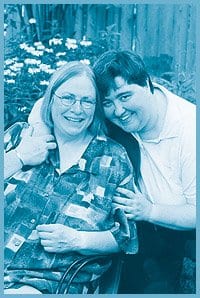An Ontario court victory for 10 same-sex marriages this month has set off celebrations – and lots of confusion as politicians and legal experts react to the ruling.
The decision by the Ontario Superior Court Of Justice (Divisional Court) has moved the concept of legal recognition of queer marriage one step closer to becoming a reality. But whether marriage is around the corner or will ultimately require a Supreme Court Of Canada decision is still uncertain.
Toronto’s city clerk is still refusing to issue marriage certificates to homo couples, saying the government has two years to decide how to fix things and that jumping the gun would be in contempt of court
Ontario Premier Ernie Eves says he’s not opposed to same-sex marriage, but that it’s not the province’s responsibility; Manitoba Justice Minister Gord Mackintosh expressed similar sentiments
Alberta Premier Ralph Klein says that if the feds or the courts okay same-sex marriage, he will use the Canadian Charter Of Rights And Freedom’s notwithstanding clause to prevent it from happening in his province.
The feds are expected to decide this week on which of a handful of options to pursue. These include appealing the ruling, which it must do by Mon, Jul 29; letting the ruling stand and make adjustments to the definition of marriage; or skipping the whole appeals process and ask the Supreme Court directly for guidance.
Federal reaction will indicate how in step they are with the population. Most polls indicate that most Canadians support same-sex marriage, and even those that don’t see it as inevitable.
“We’re ready for it, the courts are ready for it and society is ready for it,” says Douglas Elliott, lawyer for two of the couples.
The unanimous 72-page judgment by Associate Justice Heather Smith, Justice Harry Laforme and Justice Robert Blair says the exclusion of same-sex couples from marriage is unconstitutional and discriminatory.
“The constitutional and Charter-inspired values which underlie Canadian society today dictate that the status and incidents inherent in the foundational institution of marriage must be open to same-sex couples who live in long-term, committed, relationships – marriage-like in everything but name – just as it is to heterosexual couples. Each is entitled to full and equal recognition, and the law must therefore be adapted accordingly,” wrote Blair.
It’s exactly what the couples wanted to hear.
“I’m obviously delighted,” says Elliott. “Although we have had three previous attempts to get a favourable ruling, this was the first time that a court ruled that the ban on marriage was unconstitutional. This was always out of reach.”
The case, being backed by the national queer lobby group Egale Canada, was triggered when eight couples applied for, and were refused, marriage licences at Toronto City Hall during the summer of 2000. In January 2001, two couples were married at Metropolitan Community Church Of Toronto under the ancient religious tradition of the publication of banns. Ontario refused to register those licences.
While the three justices agreed that the exclusion of queer couples was unconstitutional, they disagreed on the remedies.
Laforme ruled that definition of marriage must be extended to same-sex couples immediately. However, the majority decision of Smith and Blair gave the government two years to change the legislation. If nothing is done before this time is up, marriage would be automatically extended to same-sex couples.
Sujit Choudhry, assistant professor of law at the University Of Toronto, says the government has to consider seriously whether it will appeal, given that there is a fair chance it will lose once it makes it to the Supreme Court. The next immediate step would be the Ontario Court Of Appeal, which rarely reverses a positive trial-level finding for homos.
This isn’t the first major provincial ruling on same-sex marriage, though. Just last year Justice Ian H Pitfield of the British Columbia Supreme Court ruled against same-sex couples in that province, saying government would have to change the constitution before same-sex marriage could be permitted.
Many experts dismissed Pitman’s ruling, which is being appealed.
“The BC Supreme Court decision is absolutely bizarre and completely wrong,” says Choudhry. “It has no legal credibility whatsoever. I can’t imagine it surviving on appeal.”
An additional case in Quebec is also before the courts, with a decision expected later this summer or early fall.
“Basically there are cases now in the court system in the three different provinces. If they are allowed to proceed through the normal courts of appeal they will all end of at the Supreme Court and be heard together,” says Choudhry, who would prefer to see the feds go directly to the Supreme Court, like it did on the issue of Quebec separation.
* With files from Tanya Gulliver


 Why you can trust Xtra
Why you can trust Xtra


